|
|
|
Sort Order |
|
|
|
Items / Page
|
|
|
|
|
|
|
| Srl | Item |
| 1 |
ID:
142551
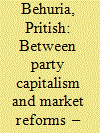

|
|
|
|
|
| Summary/Abstract |
Different strategies have been used by the Rwandan government to promote capitalist accumulation. In some sectors, party and military owned enterprises are predominant. In others, the government has chosen to embrace market-led reforms. Ultimately, the vulnerability experienced by ruling elites contributes to the choice of how capital accumulation is promoted in different sectors. Ruling elites use party and military enterprises to centralise rents and establish control over the direction of economic policy. However, centralising rents is a political choice and excludes individuals from developing access to rents. The pyrethrum sector shows that the use of such groups has resulted in unequal outcomes despite increases in productivity. Reduced international prices have stunted further productivity. Conversely, the mining sector shows evidence of the pursuit of market-led reforms. These reforms have been accompanied by rapid growth in domestic production and exports. Foreign investment was necessary in order to bring capital and expertise to the sector. However, the government has struggled to retain the capacity to enforce legislation and discipline foreign investors in line with national priorities. Both sectors show evidence that ruling elites have been prompted by vulnerability to commit to economic development. Constraints that have accompanied strategies pursued in these sectors have forced the government to work ‘reactively’ to achieve strategic targets.
|
|
|
|
|
|
|
|
|
|
|
|
|
|
|
|
| 2 |
ID:
071016
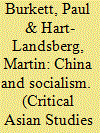

|
|
|
| 3 |
ID:
124585
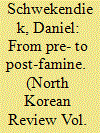

|
|
|
|
|
| Publication |
2013.
|
| Summary/Abstract |
Purpose-In the 1990s, North Korea experienced a national crisis that evolved into a famine. This paper explores the trends in underweight among preschool children measured from the pre- to the post-famine period.
Design-This research employs nutrition surveys carried out in North Korea in 1987, 1997, 1998, 2000, 2002, 2004, 2009 and 2012.
Findings-This paper shows that the country now has reached a pre-crisis level, indicating that children today are faring as well as they were during the Cold War. However, underweight rates are 24 times higher in North Korea compared to South Korea. More important, the UN targets an underweight rate of 9 percent in East Asia, but the rate is as high as 15 percent in North Korea, implying that further efforts are needed.
Originality-This paper provides rare evidence on the long-term trend in underweight among North Korean children. This is also the first paper that compares underweight rates of contemporary North Korean children with their South Korean peers.
|
|
|
|
|
|
|
|
|
|
|
|
|
|
|
|
| 4 |
ID:
162288
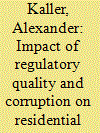

|
|
|
|
|
| Summary/Abstract |
The European electricity markets have been undergoing significant regulatory reforms since the introduction of the first liberalisation directive in 1996. Theory predicts that liberalisation promotes cost-efficient production and competition and hence leads to lower prices. The goal of this paper is to assess the impact of regulatory quality and non-compliance with the law on electricity prices in the context of electricity market reforms. We address problems of endogeneity by using the Blundell-Blond System GMM estimator and find that vertical integration and market concentration lower end-user prices, all else equal. Moreover, improving regulatory quality and reducing corruption, both have a negative impact on prices when holding other factors constant. The intensity of the reforms has limited impact on electricity prices when these reforms are introduced in an institutional environment characterised by high levels of corruption and low quality regulation.
|
|
|
|
|
|
|
|
|
|
|
|
|
|
|
|
| 5 |
ID:
146460
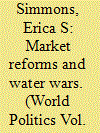

|
|
|
|
|
| Contents |
Responses to the imposition of market-oriented economic policies have varied. This article asks two questions: (1) How can we better understand when marketization will or will not prompt resistance? And (2) when people do mobilize, why are some movements broad-based while others draw on particular segments of society? The author argues that these questions can best be answered by focusing not only on the political contexts and resources available to potential social movements, but also on what is perceived to be at stake during marketization. These perceptions influence mobilization processes and the kinds of groups available for mobilization. When people understand markets as threatening to material wellbeing, as well as to widely shared community relationships, understandings, and commitments, heightened feelings of group belonging can contribute to broad-based mobilization. The author develops this argument through analysis of the broad-based, widespread movement that emerged to protest water privatization in Cochabamba, Bolivia, in 1999 and 2000. In the context of a history of agriculture, irrigation, drought, and conflict, water helped to produce and reproduce imagined communities of nation, region, and ethnic group, as well as quotidian communities revolving around the routine production and consumption of water. These meanings help to explain the dynamics of the resistance that emerged.
|
|
|
|
|
|
|
|
|
|
|
|
|
|
|
|
| 6 |
ID:
080125
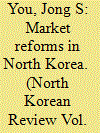

|
|
|
| 7 |
ID:
139274
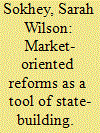

|
|
|
|
|
| Summary/Abstract |
Despite domestic opposition and several policy alternatives, in 2001 the Russian government adopted a pension reform that was potentially costly and had uncertain long-term benefits. Demographic and fiscal pressures created the desire to reform and a more cooperative Duma made it possible to do so. These points do not explain why Putin chose the pension privatisation option. Russia's pension reform is best understood as part of a state-building strategy to diminish the role of powerful bureaucracies. Russia's welfare state was not merely the product of a powerful and popular president, but rather a tool to create a stronger executive.
|
|
|
|
|
|
|
|
|
|
|
|
|
|
|
|
| 8 |
ID:
116415
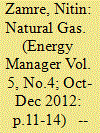

|
|
|
| 9 |
ID:
129085


|
|
|
|
|
| Publication |
2014.
|
| Summary/Abstract |
Chinese mega-city regions have become a new scale of capital acetimulation and state regulation. In recent years these regions have attracted much scholarly attention: however. the'growing research on regional spaces in China is marked by a lack of what we term "realpo- litik" and an absence of rigorous case studies. This study uses the "politics of scale" to empin'cally investigate the realpolitik factors in the intercity railway planning process in the Pearl River Delta. To this end. we establish a two-dimensional approach to unravel the intercalary and intercity politics during this process. W'e argue that in an institutional vacuum. ad hoc measures have been frequently used to facilitate interscalar and intercity bargaining. This case study also establishes a new perspective for Uinderstaiiding China's urhaii and regional transformation. Rather than treating the state as a passive agent. coping with the powerful forces of decentralization and market reform. we argue that the state has strategically redefined itself and has become even more sophisticated in its sIi1icturcs. functions. and tactics. The traditional one-sitled and unidirectional approach to state-space analysis cannot adequately address these issues. A new perspective that considers the politics of variotis scales is needed to study the emerging state regime in China.
|
|
|
|
|
|
|
|
|
|
|
|
|
|
|
|
| 10 |
ID:
072717


|
|
|
|
|
| Publication |
2006.
|
| Summary/Abstract |
Evidence from sample surveys and local field studies have long supported opposed arguments about the impact of market reform on the value of political office in the rural economy. This article reviews the evidence, describes a gradual convergence in findings, and identifies unresolved questions about qualitatively different local paths of development. Examining previously unexploited data from a nationally representative 1996 survey, a resolution of the remaining issues becomes evident. The value of political office initially is very modest, as the first private entrepreneurs reaped large incomes. However, subsequent economic development led to rapid increases in the earning power of cadres and their kin, and by the end of the Deng era the returns to political office were roughly equal to those of private entrepreneurs. The political advantages were not limited to regions that industrialized rapidly under collective ownership: they were large even in regions where the private economy was most extensive. However, despite evidence of large and enduring political advantages, those who reaped wealth from political position were only a small fraction of the newly rich, the vast majority of whom achieved wealth without current or past office-holding or kinship ties to cadres.
|
|
|
|
|
|
|
|
|
|
|
|
|
|
|
|
| 11 |
ID:
106218


|
|
|
|
|
| Publication |
2011.
|
| Summary/Abstract |
Since the start of market reforms, enterprises of the Russian military-industrial complex have lived through a massive crisis and a spectacular revival. Using original data from a longitudinal survey covering the period of 1995-2006, this article analyses the impact of transformation in the defence industry on labour and labour-management relations. We find that by the mid-2000s defence enterprises were largely able to stop job losses, eliminate wage arrears and restore wages to the level prevailing in the civilian economy. The study confirms that compared to other sectors of the Russian economy, defence enterprises continue to carry a strong legacy of the Soviet system. The dominant role of state ownership and government orders, along with the relative geographical isolation of defence enterprises and obvious factors of secrecy and security, made labour at these enterprises less willing to challenge management or owners by strikes and open protests. On the other hand, workers of defence enterprises can count on a more paternalistic attitude from managers and relatively more generous welfare benefits.
|
|
|
|
|
|
|
|
|
|
|
|
|
|
|
|
|
|
|
|
|